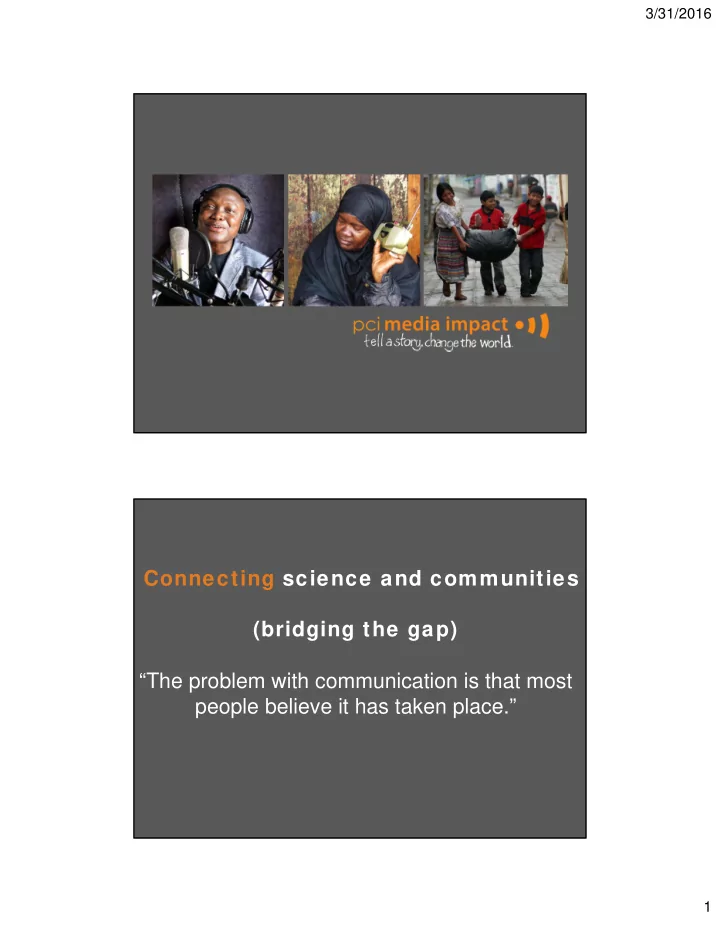

3/31/2016 Connecting science and communities (bridging the gap) “The problem with communication is that most people believe it has taken place.” 1
3/31/2016 Where We Work Stories help us imagine… New w ays of thinking New w ays of acting New w ays of relating to one another Entertainment-Education 2
3/31/2016 It all started w ith a LOVE story Simplemente Maria, Peru, 1969 Entertainment-Education Albert Bandura Social Learning Theory: People learn by observing others and the consequences of their behavior. Entertainment-Education: - Presents characters as role models (good and bad behavior) - Good characters get rewarded and bad characters punished Entertainment-Education 3
3/31/2016 Modeling good behavior A community that stands together against violence Entertainment-Education Entertainment-Education 4
3/31/2016 Diffusion Theory / Everett Rogers Entertainment-Education: -Characters show how a new behavior fits within the norms and beliefs. - Stories help to explain new behaviors in a more simpler form/language. -Characters “try” new behaviors and the story shows the consequences of it, motivating the audience to do the same. Entertainment-Education Imagine a community… Where young girls celebrate their birthdays Entertainment-Education 5
3/31/2016 6
3/31/2016 A global campaign that places Ebola survivors at the center of efforts to inform, protect and inspire hope. • Promotes public health • Reduces stigma • Shifts international narrative Campaign Goals 7
3/31/2016 Multi-Platform Approach First-Person Video Testimonials WORKING HAND IN HAND • 30 Ebola Survivors volunteered to share their stories • Survivors remained involved in every aspect of the campaign VIDEO TESTIMONIAL DISTRIBUTION • National Television in Guinea, Liberia, Sierra Leone • Played on VoA, Mashable, Al Jazeera • Over 20 partners did community screenings • Millions of views on Social Media 8
3/31/2016 Channeling the Reach of Radio Country Country Population Radio Show Reach % Population Reached Liberia 4,396,873 1,164,000 26.5% Sierra Leone 6,190,280 2,490,000 40.2% Guinea 8,746,128 5,803,000 66.3% Total 19,333,218 9,457,000 48.9% Radio Drama to Drive Dialogue 9
3/31/2016 Online and Media Distribution WEBSITE • 28,408 page views • 9,971 unique users SOCIAL MEDIA • Instagram, Twitter, Facebook, Vimeo, Soundcould, WhatsApp, Flickr • Bilingual presence (EN/FR) • 30,210 Facebook likes DIGITAL DISTRIBUTION • BiNu, World Reader MAINSTREAM MEDIA • BBC, VoA, Mashable, Al Jazeera, CNN, Radio France IMPACT • 37% Facebook followers from WA • High interaction rate compared to similar groups • Proved a significant source of learning Mobilization Channels 10
3/31/2016 Monitoring & Evaluation Key Informant Interviews: 3 countries, 60 Radio Call in interviews Social Media Show Analysis: Diagnostics 36 stations, (Facebook) 45 episodes Media Content Analysis Evaluation of SMS Surveys: 3 the countries, 3600 (International #ISurvivedEbola surveys and Local campaign media) Key Characteristics of Data Collection Methods Limitations • Use of mobile technology • Limited # questions (survey) • Remote data collection • Comparison of Exposed vs. non- • Capacity for rapid response and use of data Exposed (Vs. Pre-Post design) • Quantitative and qualitative methods (triangulation) • Targeted cell phone owners People who were exposed to the #ISurvivedEbola Campaign were significantly more likely to protect themselves from Ebola, and to be open to survivor reintegration • Audience members were 30% more likely to report confidence in their ability to protect themselves from Ebola • Overall, those exposed were 23% more likely to accept survivors back in their communities • They were 16% more likely to speak to others about Ebola • They were almost 50% more likely to have learned something about survivors • 2.4 times more likely to have reached out to a survivor via social media Impact Data 11
3/31/2016 But, what about Zika? 1. Reducing populations of mosquitoes that transmit Zika virus. Mosquito-control programmes include the use of larvicide (insecticide that kills the mosquito in its larval stage) to treat standing-water sites that cannot be treated in other ways (cleaning, emptying, or covering). 2. Personal and household protection. WHO recommends people protect themselves from mosquito bites by: • Using insect repellent; • Wearing clothes (preferably light-coloured) that cover as much of the body as possible; • Using physical barriers such as screens, closed doors and windows; • Sleeping under mosquito nets, especially during the day, when Aedes mosquitoes are most active; and • Emptying or covering containers that can hold water, such as buckets, flower pots and tyres, so that mosquitoes cannot use them to breed. 3. Pregnant women and women planning to become pregnant. Pregnant women who feel they may have been exposed to Zika virus may wish to consult with their health- care providers for close monitoring of their pregnancies. 4. Travel recommendations. The committee found no justification for restrictions on travel or trade. However, travellers to areas where Zika virus cases have been found are urged to protect themselves from mosquito bites. Pregnant women considering travel to affected areas may wish to consult their health-care provider prior to travel and after return. They should also practice personal and household steps to prevent mosquito bites. 5 February 2016 WHO Recommendations 12
3/31/2016 Fear and Rumors Personal - Beliefs - Lack of self-efficacy - Don’t like to be told what to do and listen to messages that appeal to us Social - Lack of community-efficacy - Social codes/approval (religion) - Lack of trust: outsiders and communities External - Lack of services or infrastructure (SRHR, water) - Safety - Unclear and contradicting messaging Challenges to adopting new behaviors 13
3/31/2016 Reach the audience w here they are, not w here w e w ant them to be A few lessons learned Look for solutions w ithin the community, w here are the bright spots? A few lessons learned 14
3/31/2016 Build capacity, work through existing trusted networks A few lessons learned Partnership and collaboration: w e can’t do this alone! A few lessons learned 15
3/31/2016 “We Survive” mediaimpact.org Thank You! @PCIMediaImpact www.facebook.com/PCIMediaImpact 16
Recommend
More recommend